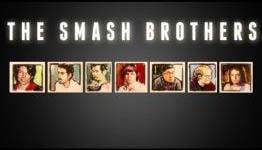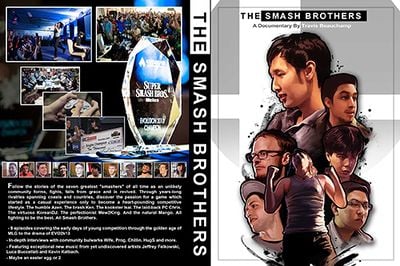The Smash Brothers: Difference between revisions
No edit summary |
No edit summary |
||
| Line 8: | Line 8: | ||
The documentary additionally describes the origins and growth of the ''Melee'' competitive scene, and community efforts to keep the scene thriving beyond the Sixth Console Generation and the discontinuation of the GameCube. The series thus covers the "Golden Era of Smash" (2003-2006), which is told over six episodes, with the remaining three episodes detailing the community's history between 2007 and [[EVO 2013]]. This history is told through primary sources, particularly video footage and photographs, as well as interviews of several members of the Smash community from the period. | The documentary additionally describes the origins and growth of the ''Melee'' competitive scene, and community efforts to keep the scene thriving beyond the Sixth Console Generation and the discontinuation of the GameCube. The series thus covers the "Golden Era of Smash" (2003-2006), which is told over six episodes, with the remaining three episodes detailing the community's history between 2007 and [[EVO 2013]]. This history is told through primary sources, particularly video footage and photographs, as well as interviews of several members of the Smash community from the period. | ||
The entire series is available for free | The entire series is available for free [https://www.youtube.com/watch?v=6tgWH-qXpv8&list=PLoUHkRwnRH-KTCH3tJ9WvsWWPEgUu-y6d on YouTube], including the [https://www.youtube.com/watch?v=NSf2mgkRm7Q&list=PLoUHkRwnRH-IXbZfwlgiEN8eXmoj6DtKM Remastered version] released in November 2013. It has been credited with a surge in ''Melee'''s popularity since its release, with some members of the community labeling the incoming generation of players as "Doc Kids". | ||
==Production== | ==Production== | ||
Revision as of 14:49, December 1, 2020
The Smash Brothers is a 9-episode documentary series produced by Travis "Samox" Beauchamp. The series was released in October 2013, shortly after what was then the largest Melee tournament of all time: EVO 2013.
The series focuses on seven professional smashers who were active in this period, labelled by the documentary as the greatest Melee players of all time: Azen, Isai, Ken, PC Chris, KoreanDJ, Mew2King, and Mango, and their effect on the competitive metagame.
The documentary additionally describes the origins and growth of the Melee competitive scene, and community efforts to keep the scene thriving beyond the Sixth Console Generation and the discontinuation of the GameCube. The series thus covers the "Golden Era of Smash" (2003-2006), which is told over six episodes, with the remaining three episodes detailing the community's history between 2007 and EVO 2013. This history is told through primary sources, particularly video footage and photographs, as well as interviews of several members of the Smash community from the period.
The entire series is available for free on YouTube, including the Remastered version released in November 2013. It has been credited with a surge in Melee's popularity since its release, with some members of the community labeling the incoming generation of players as "Doc Kids".
Production
The documentary was produced over two years[1] for a total budget of $12,000. Around $7,000 was driven by community donations, including a $4,000 Kickstarter campaign.[2].
Episodes
- Episode 1: Show Me Your Moves (Remastered)
- Episode 2: No Johns (Remastered)
- Episode 3: Don't Get Hit (Remastered)
- Episode 4: The King of Smash (Remastered)
- Episode 5: Revolution (Remastered)
- Episode 6: Paper Cuts (Remastered)
- Episode 7: The Robot (Remastered)
- Episode 8: The Natural (Remastered)
- Episode 9: Game! (Remastered)
Smashers interviewed
Other Episodes
Upcoming Episodes
Metagame is an upcoming series follow-up that covers the " Five Gods of Melee," funded with a Kickstarter of $34,583.[3] On November 23rd, 2020, a trailer released, along with the announcement that the series would premiere on Twitch on December 11th-13th, 2020.[4] Episodes 1-3 will be aired on December 11th at 2 p.m. PT, Episodes 4-6 will be aired on December 12th at 2 p.m. PT, and Episodes 7-8 will be aired on December 13th at 2 p.m. PT. As of January 22nd, 2017, only 4 episodes were completed, being done with only half of the series. Amsa and Wes were mentioned as part of a promotion video as well.[5]
'Doc Kids'
Doc Kids are the new generation of players who, as Tafokints put it, "basically represent people who got into the game after Aug 2013 in light of the Smash Documentary". With the end of the documentary based around EVO 2013, the tournament marked the dawn of a new age in Melee. The media interest in the event as well as the documentary helped draw in members to the Melee community almost exponentially. Fiction theorized that - given 3 years of directed effort - a player could reach 'top-100' status. This has been proven by several players who began playing post-documentary, namely;
- Zain (The first 'Doc Kid' to win a major tournament, doing so at Shine 2018. Began playing in May of 2014 - Ranked 6th on the 2019 MPGR)
- iBDW (Began playing in Spring 2015 - Ranked 9th on the 2019 MPGR)
- Captain Faceroll (Began playing in September of 2013 - Ranked 17th on the 2019 MPGR)
- Ginger (Began playing in 2014 - Ranked 21st on the 2019 MPGR)
- Spark (Began playing in January of 2014 - Ranked 22nd on the 2019 MPGR)
- ARMY (Began playing in 2015 - Ranked 26th on the 2019 MPGR)
- AbsentPage (Began playing in August of 2014 - Ranked 27th on the 2019 MPGR)
- Albert (Began playing in April of 2014 - Ranked 37th on the 2019 MPGR)
- FatGoku (Began playing in 2013 - Ranked 39th on the 2019 MPGR)
References
- ^ https://www.reddit.com/r/smashbros/comments/1ssxjn/hello_all_samox_here_creator_of_the_smash/ce12k3i/?context=3
- ^ https://www.reddit.com/r/smashbros/comments/1ssxjn/hello_all_samox_here_creator_of_the_smash/ce11v84/?context=10000
- ^ https://www.kickstarter.com/projects/eastpointpictures/the-smash-brothers-armada
- ^ https://www.metagamedoc.com/
- ^ https://www.youtube.com/watch?v=YdITYxzYT8c

